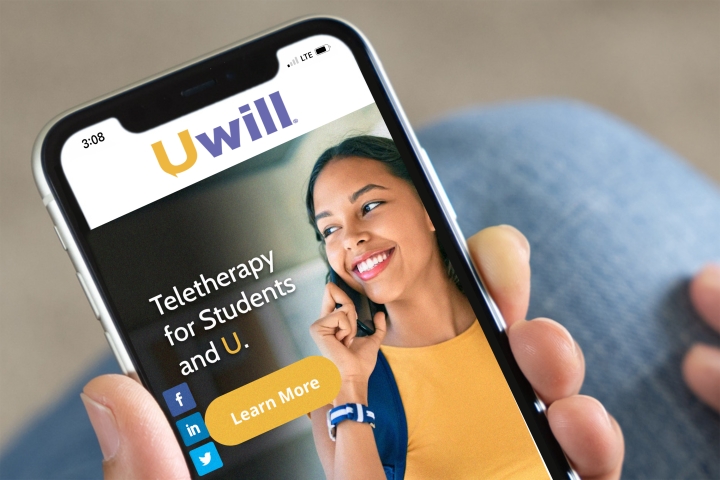Beginning Nov. 1—due in large part to student advocacy—all students with a valid Dartmouth email account will have free access to licensed mental health counseling services via phone, video, and chat, thanks to a new partnership with the student teletherapy provider Uwill.
The new service—which is meant to complement Dartmouth’s existing mental health services for undergraduates and graduate students—comes in the midst of an intensifying mental health crisis across the nation and as the campus mourns the loss of several community members.
Mark Reed, director of the Dartmouth Health Service, says bringing a teletherapy option to students has been in the works since winter 2021, thanks to the efforts of several student-led groups, including the undergraduate and graduate student governments and the Mental Health Union, a student group that advocates on mental health issues.
Leaders from Dartmouth Student Government and the Mental Health Union worked directly with trustees, senior administrators, and the Counseling Center to select Uwill as the best provider for student teletherapy services.
“Nationwide, many college-aged students are experiencing mental health issues, and Dartmouth is not immune,” Reed says. “We’ve been paying attention to what students want, and we know that flexibility in how they access mental health services is key—a system that is easy to use and gives them the care they need when they need it. Uwill greatly expands our ability to meet student demand, on-campus and off.”
David Millman ’23, the president of the Dartmouth Student Government, says he and other student leaders believe adding teletherapy services to the mental health services Dartmouth offers will make a major impact.
“This announcement signals very clearly that Dartmouth is listening to student advocacy around mental health and is taking steps to provide more options for care as we work to keep building a more supportive community together,” Millman says. “I’m so grateful that the work we’ve done as students these past years has resulted in something as impactful as this. I’ve heard from so many students for years about issues around mental health that the Uwill partnership will directly help address, including providing 24/7 crisis services and long-term counseling options for all students at no extra charge. We look forward to continuing the work we’ve started with everyone in our campus community to make this college a better place.”
All students will soon receive an email with instructions on how to access Uwill, says Reed.
(Students interested in contacting Uwill can go to the Uwill log in screen and register. Once a student has created and verified their profile, they can log in to search for a therapist and make an appointment.)
Uwill specializes in meeting the mental health needs of college students through same-day counseling services and around-the-clock emergency crisis support. Students will have access to unlimited sessions—available with flexible hours outside of usual business hours—at no cost. All Uwill services comply with federal requirements for privacy and security, including the Family Educational Rights and Privacy Act (FERPA) and the Health Insurance Portability and Accountability Act (HIPAA). Uwill never shares student data with third parties.
The system is straightforward and simple to use, says Heather Earle, director of the Counseling Center. Students can select from a diverse pool of therapists according to gender, language, ethnicity, and clinical need—supplementing the strong diversity of the Dartmouth counseling staff.
Based on a student’s profile and preferences, the program will match them to therapists who can be available immediately. All Uwill services are web-enabled, which means students can access them on any smart phone, tablet, or computer, and students can choose how to meet with their therapist—via phone, video, chat, or messaging.
Crucially, says Earle, Uwill helps make licensed counseling services available to students who are not on campus—including students who are on an off-term, a personal leave of absence, or a medical leave—as long as they are within the United States and have an active Dartmouth email address.
Student Government Vice President Jessica Chiriboga ’24, who co-chairs a working group for the Dartmouth-JED Campus Undergraduate Committee, says she is grateful for the way in which Earle and her colleagues included students in the search for the right teletherapy service.
“I appreciate Uwill because it fills the gaps in currently available counseling services by offering free, 24/7, and long-term counseling to Dartmouth students,” Chiriboga says. “Students have been looking for a long-term counseling option for years, so I am incredibly pleased and excited about Uwill.”
Faculty and staff continue to have access to teletherapy services through the Faculty/Employee Assistance Program.
Among other initiatives aimed at supporting community well-being in recent years, Dartmouth has expanded its on-campus counseling staff and has partnered with the Jed Foundation’s JED Campus program. In addition, students, faculty, and staff now have free access to Headspace, which provides mindfulness and meditation tools.
“There is no single program that will meet the needs of every individual on this campus, and that’s why we are adopting a range of solutions, including teletherapy,” says Reed. “These initiatives have support of Dartmouth senior leaders and are a top priority of the Board of Trustees. The bottom line is that we want students to be able to get help whenever they need it, wherever they are because this is a community that cares about its members’ well-being.”
